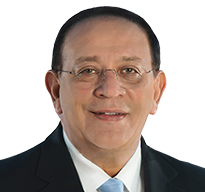Agenda | All times Malaysia Time (UTC+8)
Monday, December 07
Mohamed Firouz Asnan
Senior Vice President
Malaysia Petroleum Management
PETRONAS

Montri Rawanchaikul
President and Acting Executive Vice President
Production Asset Group
PTTEP
The energy industry is facing continued challenges in the development of assets with high contaminants, especially those with those with high CO₂ and H₂S. This is becoming a high priority for operators, service companies, and regulators alike. Collectively, they are looking for effective solutions to address the challenge of commercializing these assets. Advancement in CCUS-related technologies are one of the key areas being considered to spur monetisation of high CO₂ gas fields, from both the commercial and technical perspectives. As there are plenty of fields with high contaminants remains undeveloped, it is critical for the industry to explore all viable technologies, including options to convert contaminants into valuable products as one of the initiatives to reduce carbon emission, ultimately providing a positive environmental impact.
This session will engage leaders in the region to discuss opportunities and challenges, share experiences and lessons learnt, and deliberate how stakeholders can work together and focus on what can be done in progressing CCUS and contaminants management into reality.
Speakers:
- Re-Assessment and New Approach to Utilise Gas Potential in Ogan Field, Taufik Fansuri, Pertamina EP
- Integration of Carbon Capture and Storage (CCS) Approach and Enhanced Oil Recovery (EOR) By Using Stored Carbon As A Transition for Optimising Recovery of An Oil Reservoir, Clifford Louis, University of Calgary and Muhammad Hassan Khan, NED University of Engineering and Technology
- A Paradigm Shift For CO2 Injection Simulations, Geovani Christopher and Kate Evans, Halliburton
It is well known for releasing CO2 emissions into the atmosphere have a negative long-term impact on the environment. Many countries around the world have moved are seeking to move to Carbon Capture Utilisation and Storage (CCUS) as an alternative method to reduce emissions by successful CO2 subsurface storage. Site Selection and maturation are critical steps in the overall CCUS project and many subsurfaces and engineering studies need to be completed to determine the type and location of the storage site.
Four main types of CO2 storage locations can be considered in the site selections process:
1. EOR Field with CO2 Injection
2. Depleted Oil and Gas Reservoirs
3. Deep Saline Aquifer
4. Coal Seams.
This session aims to discuss such key technical aspects for assessments of CO2 storage capacity/injectivity, containment, well integrity, and a monitoring, measurement and verification program.
Speakers:
-
Integrating Underground Gas Storage Experience to Enhance Carbon Capture and Underground Storage Site Selection, Zis G. Katelis, GaffneyCline
-
Well Integrity Challenges Associated with Existing Plugged and Abandoned (P&A) Wells in CO2 Storage Reservoir in Central Luconia Gas Fields in Sarawak, Dr. Parimal Arjun Patil, PETRONAS Research Sdn Bhd
-
Assessment of Producing Gas Fields as Possible Candidate for CCS Project in Sarawak, Puntira Henglai and Jakkree Kongchum, PTTEP
Tuesday, December 08
Projects that capture, use and geologically store carbon dioxide (CO2) and other contaminants produced during oil and natural gas production have been in commercial operation for many decades. Globally it has been estimated that a total proven and probable resource of around 4 trillion m3 of net hydrocarbon gas exists in such fields, but they remain mostly undeveloped or underdeveloped due to a lack of economic and environmental viability associated with the production of associated CO2 and other contaminants.
There is a significant presence of these fields in the Asia-Pacific region which has proven to be a hinderance to developing domestic sources of natural gas to a growing regional market. In order to unlock the resource for future use, this panel session will bring together distinguished regional and international executives and experts to discuss the past, present and future of successfully developing oil and natural gas fields with a high CO2 content and other contaminants. The panel of distinguished speakers will discuss and share insights on key issues related to:
- What have been some of the key attributes for successful field development?
- What are the regional differences in policies and regulations to support projects?
- What are the best practices for reservoir development and processing facilities?
- What are the key economic hurdles for projects and how can these be overcome?
- What impact will the energy transition now have on the development of these resources?
- What will be the impact of successful development on regional and international energy markets?
Greenhouse Gasses Emission Mitigation is a major industry challenge that requires collaboration between oil and gas industry players and government regulators to form an effective industry-wide performance standard to reduce nett carbon emissions into the atmosphere. CO2, making up 80% of GHG, is one of the factors contributing to climate change and global warming through the burning of fossil fuels. Therefore, tackling climate change is a pressing challenge for the oil & gas industry while it needs to respond to the increasing energy demand with an ever-lower carbon footprint. The industry requires innovative and creative ideas to look at what can be done to mitigate GHG emissions in the current oil & gas portfolio of assets, develop effective strategies to address GHG emissions in the future portfolio and encourage the growth of low CO2 solutions that can be deployed to meet these challenges.
This session covers the sharing of experiences from the industry, in which our invited speakers will present and discuss their insights on the following GHG abatement topics:
- Results and lessons learned from Carbon Capture and Storage projects
- The revolutionary technique of Enhanced Oil Recovery (EOR) through the prolonged CO2 injection in depleted oil fields.
- Employing electrically driven compression using local power generated from hydro-electric to reduce overall GHG emission.
Speakers:
- Green House Gasses and Emissions Mitigation, Clifford Louis, University of Calgary and Muhammad Hassan Khan, NED University of Engineering and Technology
- JX’s Initiatives for Environmental Measures, Ichiro Shikano, JX Nippon Oil & Gas Exploration Corp.
-
Innovative Way Of Greenhouse Gas Abatement In Energy Intensive Project, Raymond Loh Ngie Loung, Sarawak Shell Berhad
What has been emphasized in recent years is how we increase the economically feasible Carbon dioxide Capture and Storage (CCS) projects. Despite the great expectations for CCS as a key option for reducing CO2 accumulation in the atmosphere, the number of large-scale integrated CCS projects is still limited. When we understand its major reason as the lack of commercial profitability, the concept of Carbon dioxide Capture, Utilisation and Storage (CCUS) is worth noting. To date, as typified by CO2 Enhanced Oil Recovery (CO2-EOR) and carbon mineralisation, projects that conduct emission reductions while securing profit have been realized or demonstrated.
In CO2-EOR project, CO2 is injected into an oil reservoir to increase oil production and a part of the injected CO2 is incidentally trapped in situ.
In the carbon mineralisation project, CO2 is converted to carbonate as the valuable material for cement and concrete industries. Such projects are expected to create added value and expand opportunities for CCS deployment.
In this session, the recent activities related to CCS and CCUS projects will be introduced by the technical experts of the leading companies in oil and gas industries. The new approach, emerging technologies, the status of the current CCS/CCUS projects will be discussed.
Speakers:
-
Pre-Feasibility Study of CCUS-EOR in LN Field at South Sumatera, Indonesia, Dadan Damayandri, LEMIGAS
-
CO2 Utilization and Sequestration in Concrete, Issam Amr, Saudi Aramco
-
Northern Lights – ‘Open Source’ CO2 Transport and Storage, Knut Bakke, Shell
Wednesday, December 09
Carbon capture, utilisation and storage (CCUS) technology and contaminants management is fast becoming an important approach to reduce carbon dioxide (CO2) emissions, contaminants and optimise the structure of energy consumption in Asia. In order to provide guidance and recommendations for CCUS and contaminants management research and development a technology roadmap has to be set-up. The roadmap should outline the overall vision for an organisation to provide technically viable and economically affordable technological options to combat climate change and minimise their contaminants levels. Based on this vision, milestone goals are set out in accordance with the technology development environment.
This panel session will bring together key stakeholders from the industry to share knowledge, scientific studies, global, regional and local developments on the subject. The panel of distinguished speakers will discuss and share insights on key issues related to:
Building your technology roadmap for CCUS and contaminants management
Identifying the critical technologies in capture, transportation, utilisation, storage of CO2 and contaminants management
- Identify technical priorities in the different stages of each technical aspect by evaluating indices
- How the roadmap can provide recommendations on deployment of full-chained CCUS and contaminants management projects
- Policies which would support CCUS and contaminants management
- Key challenges in adopting CCUS and contaminants management in oil and gas industry
Natural gas and oil sometimes contain natural occurring contaminants, such as carbon dioxide, sulfur compounds and mercury. These contaminants have the possibility to become a potential risk to safety and environmental issues in oil and gas production. For stable production and safety and environmental response, oil and gas producers should well manage and/or remove these contaminants.
This session will focus on various technologies for effective contaminants management.
Including:
- The strategy of selecting the best H2S scavenger chemical for surface and downhole application
- Case study of the application of removal membrane for acid gases
- Improvement of sampling and monitoring methods for mercury to enhance the value of gas and oil assets
Speakers:
-
Mercury Management Strategy-Improving Analyses, Monitoring and Operating Philosophy to Maximise Gas Wells Potentials, Wan Amni W Mohamad, PETRONAS Carigali Sdn Bhd
-
Chemically Cleaning Assets Adam Dassey, Chevron ETC
Speakers:
- A Novel Artificial Intelligence Framework Enhancing Sustainability In Reservoir Management, Klemens Katterbauer, Saudi Aramco
- Cold Injection Challenge – The key to unlocking CCS in North Sea, Anurag Mittal, NAM (Shell)
- Integrated Coupled Modelling Study to Assess CO2 Sequestration Potential in A Depleted Gas Field, Ahmad Ismail Azahree, PETRONAS Research Sdn Bhd
